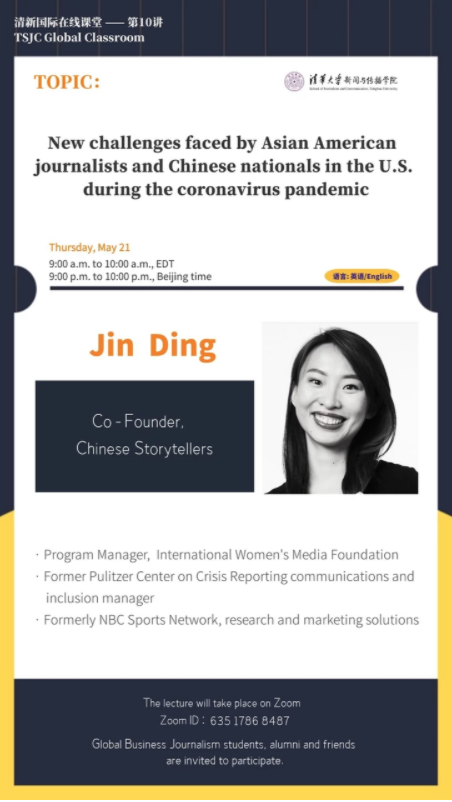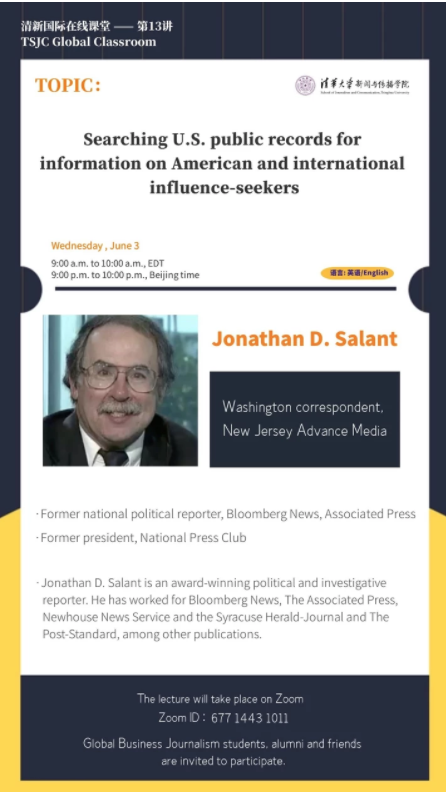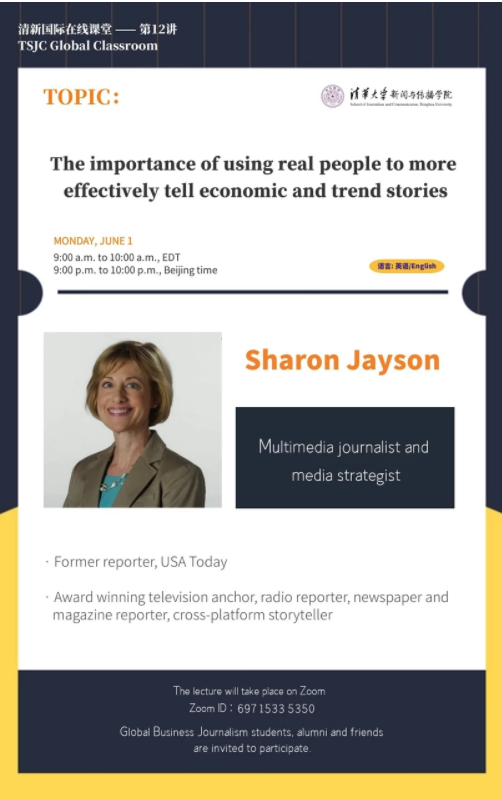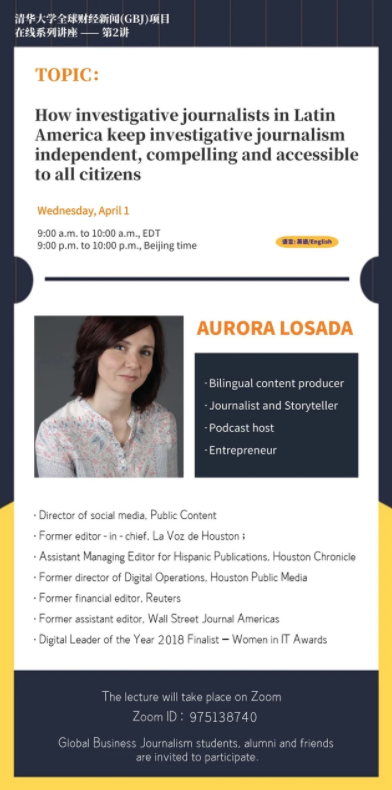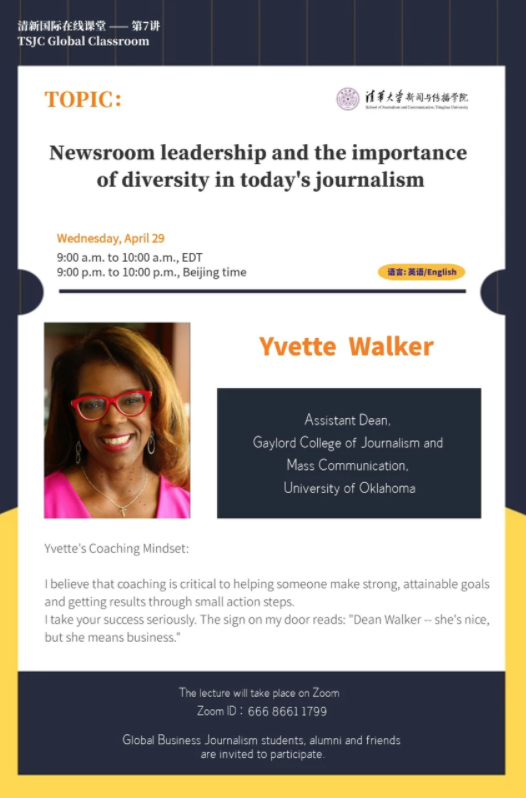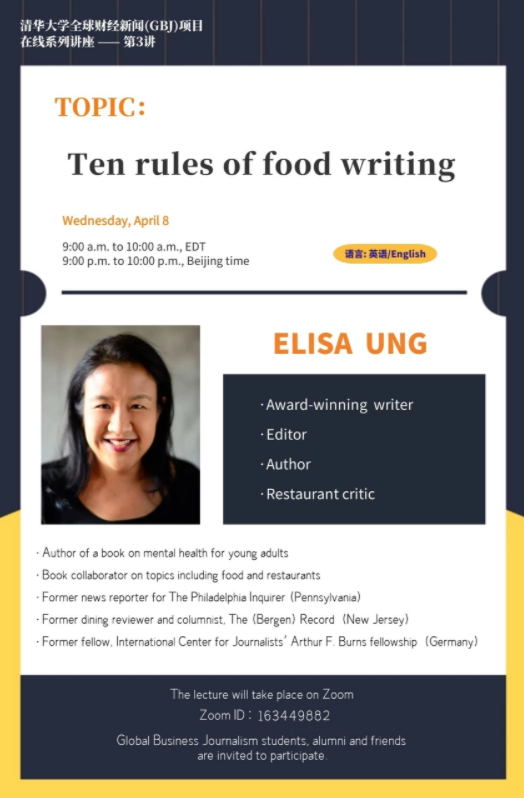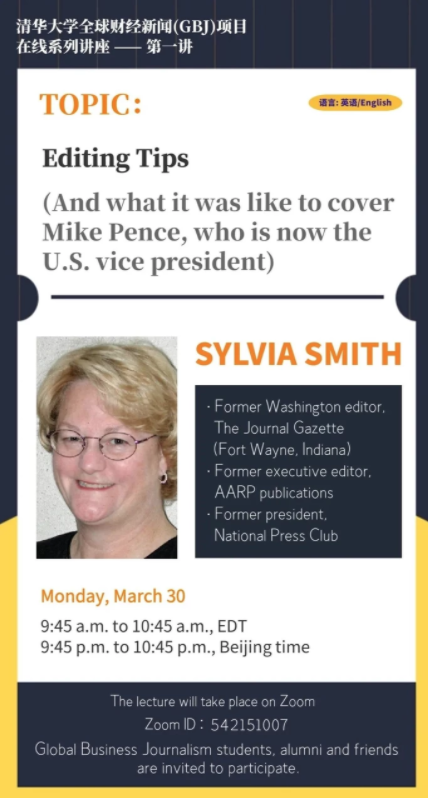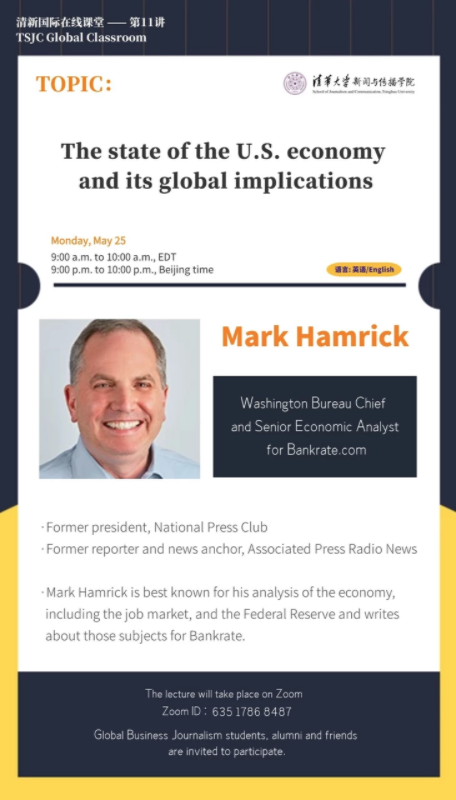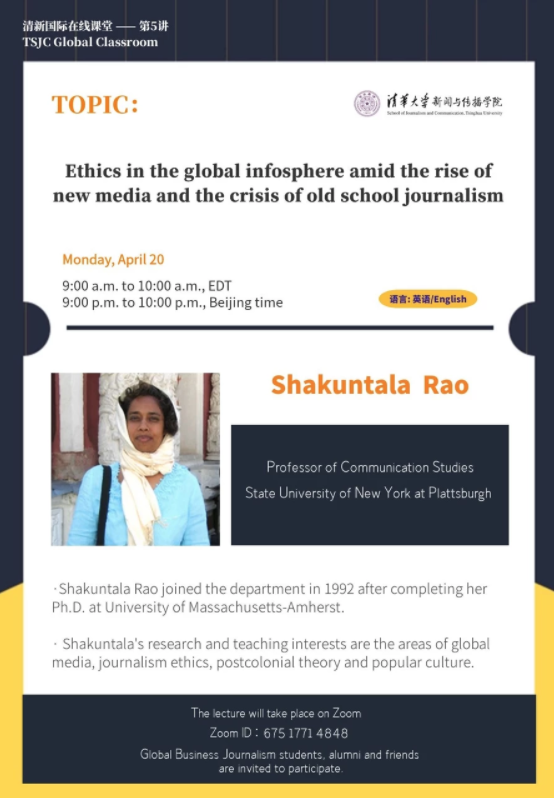
By BISMA AHMAD
Global Business Journalism reporter
Professor Rick Dunham came up with the idea of the Global Business Journalism Lecture Series in the early weeks of the coronavirus pandemic in order to bring the Tsinghua University program to the world.
“An innovation born out of necessity,” he calls the diverse series of 16 speeches on topics ranging from journalism skills to international public policy issues.
With the Tsinghua campus shuttered following the COVID-19 outbreak in Wuhan, Professor Dunham, the Global Business Journalism master’s program co-director, created a community-building initiative to bring together Tsinghua students who were stranded in their home cities, program alumni and prospective students. The free lectures helped students and alumni improve their journalism skills, from data research to investigative reporting, and keep up with the most important news stories around the world, from the economic devastation wrought by the coronavirus to America’s reckoning with racism following the killing of George Floyd in Minneapolis.
Professor Dunham said he sought a diversity of voices from different backgrounds and perspectives, with a special emphasis on influential women in academia, business and journalism. Among the renowned journalists who participated in the series were Lise Olsen, Rochelle Riley, Jin Ding, Jonathan D. Salant, David Paulk and Sharon Jayson. Prominent academics included ethics scholar Shakuntala Rao and public-diplomacy expert Nancy Snow. Kristiina Helenius and Mark Hamrick were among the eminent economic analysts who discussed the latest business trends from around the world.
The Global Business Journalism Lecture Series was launched in March, before the coronavirus outbreak became a global pandemic. It was on the cutting edge of a shift of university programs from classrooms to remote learning platforms. Professor Dunham said the lecture series allowed the Global Business Journalism Program to tap into the expertise of experts around the world without the cost and logistical difficulties of bringing them to the Tsinghua campus.
“Our Global Business Journalism community was able to learn from some of the smartest journalists and academics in the world without leaving their homes,” Professor Dunham said.
The biggest challenge of the lecture series, he said, was geography. Global Business Journalism students and alumni are spread over five continents and 19 time zones. But the lectures, held in the evening in China and the morning in North America, attracted more than 500 participants. Students and alumni actively engaged with the speakers, who took questions from the audience after completing their lectures.
One of the speakers, award-winning journalist Lise Olsen of the Texas Observer, shared her expertise in investigative reporting. It is very important to do thorough research to produce an exceptional story, she told the participants.
“An investigative journalist is an expert assembler of jigsaw puzzles, whose pieces are missing and dispersed,” she said. “And we try to put them together to give our readers a bigger picture, or filling in what’s missing.”
Veteran political reporter Jonathan D. Salant provided a tutorial on data journalism, showing participants how they could track down the work of corporate and government lobbyists. Sharon Jayson, a longtime USA Today reporter, explained how trend stories become more powerful to readers if you “put a face on your story.”
“When you use real people in stories, they become more relatable and interesting to read,” she said.
Other lectures focused on topical economic and social events. Rochelle Riley, an author and former newspaper columnist, talked about racism in America. Riley, now the director of Arts and Culture for the city of Detroit, Michigan, said racism has been a stain on the United States throughout its history. The killing of George Floyd by a Minnesota police officer earlier this year gave this issue gained much deserved attention, she said.
Riley quoted from an essay in her book, “The Burden,” a collection of essays about the cost of racism in America.
“America must pay more attention to emotional brutality,” she said. “That boils down to single cause – slavery – a word that has been as much part of our living history in America as our flag.”
Because of the overwhelmingly positive response to the lecture series, the Global Business Journalism program has added a new course for the fall 2020 semester composed of a series of guest lectures on timely topics. The course, called “Topics in Global Politics and Economics,” is scheduled to be taught by Professor Dunham. Students in the two-credit course will write news stories about the guest lectures and produce an analytical story on a major global issue.
Most of the lectures will take place on Tuesdays at 9 p.m., China time. Additional guest lectures on journalism skills will be scheduled as part of GBJ’s “Basic News Writing” course on Wednesdays at 9 p.m., China time.
You do not need to be enrolled in the courses to participate in the lecture series. All lectures are open to Global Business Journalism students, alumni, prospective students and GBJ friends. Upcoming lectures will be posted on the Global Business Journalism international website at https://www.globalbusinessjournalism.com/lecture-series.
Q&A with Professor Rick Dunham
Q: How did you come up with the plan for the Global Business Journalism Lecture Series?
A: There were two main reasons. First, I wanted something good to come out of the disruptions caused by the coronavirus outbreak. Second, I thought I could take advantage of the friendships and contacts I’ve made during 35 years in journalism to provide a useful, illuminating program that could help us build a larger GBJ community.
Q: How did you choose the speakers?
A: I wanted an eclectic mix of speakers from different backgrounds and different viewpoints. We had speakers from the U.S. and China, Latin America and Europe. We had speakers of African and Hispanic descent. Our program is about three-fourths women, and I thought it was important to show strong, accomplished women, especially in the world of journalism. We covered a variety of themes, such as hot global news topics, journalism issues, international economic trends and the impact of the COVID-19 pandemic on economics and social order around the world.
Q: What do you think is the primary accomplishment of the lecture series?
A: We formed a global family through these lectures. We involved current students, alumni and prospective students. And we gave journalists, students and friends from countries around the world a look at the best of Global Business Journalism and to Tsinghua University. Academically, these thought-provoking lectures enabled students to get a glimpse of the kind analytical thinking that we encourage in classes, and it deepened our students’ and our GBJ graduates’ expertise in journalism skills. You are never too old or too experienced that you can’t learn something new.”
